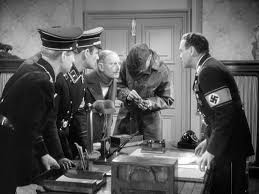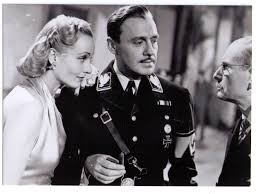


“If I shouldn't come back, I forgive you what happened between you and Sobinski. But if I come back, it's a different matter”
To Be or Not to Be is one of the best satire films ever made. Made before America entered World War II and Hitler and the Nazis could be seen as a non-threatening idiot, the film cleverly and wittingly takes a stab at the madman and his followers. The film pokes fun at the Nazis not being too bright and allowing the actors of an acting troupe to get the best them.
Josef Tura and his wife Maria (Jack Benny and Carole Lombard) are two of Poland’s most famous actors… depending on who you talk to. At the beginning of the film the theater is rehearsing for a new play about Hitler and the Nazis. Unfortunately officials come in telling the troupe that they are no longer allowed to stage the play because of growing tensions between Poland and Germany. Instead the theater announces that Hamlet will now be showing.


In the audience is a young Polish soldier named Sobinski. He is in love with Maria and has seen many of her performances and read about her in all the papers. He gets to go backstage and meet his crush. Maria is very taken with the young man and tells him when Hamlet starts his soliloquy to come back to her dressing room. Sobinski gets up when the line “to be or not to be” is spoken and causes a big to do. Josef is none too pleased and gets thrown off. For the next few days the same thing happens again and again. Before Josef has time to find out why the soldier keeps getting up the Nazis storm into Poland and Sobinski heads to England with the troops.
In England the Polish soldiers are manipulated into giving a doctor as well as fellow countryman the names of their families and where they live so when he goes back he could give word to them that their families are ok. Sobinski’s family are safely out of the country so he tells the doctor to send along the message “To be or not to be” to Maria.
The doctor as it turns out is really a Nazi spy. He took the names of the pilots so the Nazis could kill them and their families. The message Sobinski has given to the doctor is taken to mean some kind of a hidden message. The Nazis find Maria and tell her to go to Nazi headquarters to talk to the doctor. The doctor talks to Maria playing to her vanity of fine living and of being an actress asking her to be a spy for the Nazis. If she does she can have all the nice things she used to have and more.
Meanwhile, Sobinski was sent to Poland to find the doctor and bring the man back as a criminal. He finds Maria after he has been on the run and she lets him stay in her apartment. Josef comes back to the apartment while Maria is with the doctor. He notices the man looks like the one who used to get up in the middle of Hamlet. He recites the line and on instinct Sobinski gets up out of bed. Before he can get really angry Maria rushes into the room and tells them both of the doctor’s offer. They make a plan for Maria to go back to the doctor the next day and the theater company will dress up like Nazis telling the doctor to come to their headquarters in town which is actually the theater so they can kill him.
All the dressing up and acting as Germans lands the group, especially Maria and Josef in some trouble along the way. The acting and trouble leads to many funny scenes. The dialogue is comes fast in some instances and said very subtly like most 1940s screwball comedies. I found in the first half hour to forty-five minutes many of the lines were the funniest. I enjoyed the first interaction between Maria and Josef; they are both such egotistical actors it seems amazing they are still married. Maria says to Josef “It's becoming ridiculous the way you grab attention. Whenever I start to tell a story, you finish it. If I go on a diet, you lose the weight. If I have a cold, you cough. And if we should ever have a baby, I'm not so sure I'd be the mother” and he replies “I'm satisfied to be the father.” A line I found to be clever was when Josef was dressed up as a Gestapo he asked the real Gestapo if he had ever heard of “the great actor Josef Tura” and the other man says that yes he has heard of Tura he even saw him once in Hamlet and “What he did to Shakespeare we’re doing to Poland.” Another scene with Josef in disguise someone says about the Germans putting people into concentration camps “We do the concentrating and the Poles to the camping.”

The first piece of information you will find when looking up To Be or Not to Be is that this was Carole Lombard’s last film before she died in a plane crash. Knowing this fact kind of tarnishes the film in some way, I don’t know maybe it is me who only sees it that way. Many have said this was the role for Lombard that had she lived would have propelled her to a new level of comedy and to a new level as an actress. You can see that, you can see she was on to a new path in her career. Lombard was very good as Maria Tura. The character was good. I enjoyed watched Lombard as the egotistical, love hungry but caring actress. Maria cared for her country and did what she had to do. A scene I liked her in was at the beginning when Sobinski firsts comes backstage to see her and he tells her he is a bomber and that he can drop three tons of dynamite in two minutes. Right away we can see this is some kind of subtle sexual innuendo and Maria finds this fascinating. The way Lombard played the scene was excellent. You can always tell when an actor or an actress is really good when they can make a reaction look real. In a scene with Josef as a Gestapo he once again asks a real Gestapo if he has ever heard of the “great actor Josef Tura” and I believe the Gestapo officer tells Josef the Shakespeare and Germany doing the same to Poland line. Josef’s face and ego fall so hard and all Maria does is look away and laugh because she knows the blow it caused. Lombard’s reaction was perfect; it looked like she was really taken with how funny the reaction was.

Jack Benny was fabulous as Josef Tura. Before this film Benny had been in some films but none of them were really big hits. He was a popular radio personality with his own show. His running gag in the film would be asking people if they have “ever heard of the great actor Josef Tura.” The gag does not even get old it just gets funnier because most of the peoples’ responses are different and his reactions to their responses is always different. It was funny how he wanted to be a good Pole and help his country when the whole time all he wanted to do was wrong Sobinski’s neck for walking out on his soliloquy and for sneaking around with his wife.

To Be or Not to Be was not well received when it was originally released in 1942. By that time America was involved with the War and Carole Lombard had died. I read someone compare this film with Charlie Chaplin’s The Great Dictator; many people felt that these films were in poor taste due to what was truly happening in Europe. Unfortunately these films were released after America entered the War and the humor was lost. Many critics and viewers were sore with Ernst Lubitsch for the Shakespeare joke and many did not get the joke. Lubitsch put his view of the film the best in a response to one critic:
"What I have satirized in this picture are the Nazis and their ridiculous ideology. I have also satirized the attitude of actors who always remain actors regardless of how dangerous the situation might be, which I believe is a true observation. It can be argued if the tragedy of Poland realistically portrayed as in To Be or Not to Be can be merged with satire. I believe it can be and so do the audience which I observed during a screening of To Be or Not to Be; but this is a matter of debate and everyone is entitled to his point of view, but it is certainly a far cry from the Berlin-born director who finds fun in the Warsaw."
Today To Be or Not to Be is considered one of the best films made in America. It is an entertaining film with many good lines and excellent acting by not just Carole Lombard and Jack Benny but by the entire cast. To Be or Not to Be is a comedy film not to be missed.




No comments:
Post a Comment